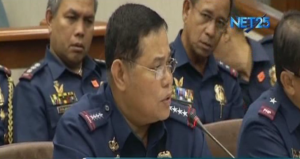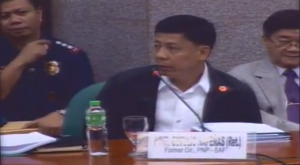
MANILA, Philippines — The Office of the Ombudsman has found probable cause to file charges before the Sandiganbayan against Alan Purisima, former chief of the Philippine National Police (PNP) and Getulio Napeñas, former PNP-SAF Director in connection with the 25 January 2015 Mamasapano incident that left several casualties including members of the 44 Special Action Force (SAF), the biggest loss of a government elite force in history.
The police officers are facing charges for Usurpation of Authority or Official Functions (Article 177, Revised Penal Code) and violation of Section 3(a) of the Anti-Graft and Corrupt Practices Act (Republic Act No. 3019).
Documents and evidence reviewed by the panel of investigators reveal that in November 2014, the PNP-SAF submitted to Purisima the concept of operations for Oplan Terminator I and II, targeting bomb expert Marwan. Meantime, in December 2014, the Office of the Ombudsman issued an order directing Purisima’s preventive suspension effective from 09 December to 10 June 2015 relative to the WERFAST courier service contract anomaly.
 Despite his preventive suspension, Purisima and Napeñas coordinated a top level meeting with officers of the Armed Forces of the Philippine relative to Oplan Exodus. The planning proper started on 23 December 2014. In January 2015, Napeñas sent a text message to Purisima requesting a meeting to discuss the report on operations. On 09 January 2015, Purisima and Napeñas proceeded to Malacañang to provide the president with mission updates and a new concept of operations. Four days later, on 13 January 2015, Napeñas sought Purisima’s approval of the secondary date for the conduct of operations scheduled from 23 to 26 January.
Despite his preventive suspension, Purisima and Napeñas coordinated a top level meeting with officers of the Armed Forces of the Philippine relative to Oplan Exodus. The planning proper started on 23 December 2014. In January 2015, Napeñas sent a text message to Purisima requesting a meeting to discuss the report on operations. On 09 January 2015, Purisima and Napeñas proceeded to Malacañang to provide the president with mission updates and a new concept of operations. Four days later, on 13 January 2015, Napeñas sought Purisima’s approval of the secondary date for the conduct of operations scheduled from 23 to 26 January.
The records reveal that Purisima gave the intelligence packet to Napeñas and tasked the SAF to conceptualize the Marwan operation; he also directed Napeñas to brief the president regarding Oplan Exodus; approved the final date of operation, constantly received pre-operational updates from Napeñas; monitored events and relayed crucial information to Napeñas during that fateful date and sought updates on the ground situation.
Based on the complaints filed by the Field Investigation Office, Purisima was charged for usurping official functions and for violating the chain of command when he actively participated in the mission planning and execution of Oplan Exodus despite the Ombudsman’s preventive suspension order. Napeñas, on the other hand, was considered as Purisima’s cohort for taking orders from a suspended PNP chief, without the knowledge and approval of OIC-PNP Leonardo Espina.
As defense, Purisima claimed that “during his preventive suspension, there was never any explicit representation that he was acting as the Chief PNP.” Meantime, Napeñas alleged that “Oplan Exodus was a high-combat operation incapable of perfect execution.”
In the 40-page Joint Resolution, Ombudsman Conchita Carpio Morales ruled that “during the period of Purisima’s suspension, he had no authority to perform the duties and functions, much less supervise and/or participate in the conceptualization, mission planning, and execution of a high risk police operation.”
According to Ombudsman Morales, “in short, Purisima was sending the unwritten yet visible message that he was, albeit he was not authorized to act and function as Chief PNP.” She added that, “if Purisima had an iota of respect for the PNP Chain of Command, he should have informed, at the very least, of the details of the Plan Exodus during the turnover of his duties and functions to OIC-PNP Chief Espina.”
In so far as Napeñas, the Ombudsman ruled that “by taking orders from the suspended Purisima, [it] can be construed as an act in agreement to commit the crime of usurpation of official functions with Purisima.”
“[Napeñas’] justification to heed such order—that Purisima was the Commander-in- Chief’s most trusted man and was allowed by the President to participate in the planning and execution of the Oplan—does not lie,” said Ombudsman Morales.
The charges for violation of Section 3(a) of R.A. No. 3019 stand “as Purisima wielded his power and influence as Chief PNP, to induce Napeñas, who willingly allowed himself to be so induced, to violate the PNP chain of command, by giving instructions to, receiving recommendations from and approving the actions of Napeñas.”
Aside from criminal indictment, Purisima and Napeñas were also found administratively liable for Grave Misconduct, Gross Neglect of Duty and Conduct Prejudicial to the Best Interest of the Service. However, since Purisima was ordered dismissed from the service in June 2015 and Napeñas retired in July 2015, the alternative penalty of fine equivalent to their salary of one year was imposed. They were also meted the accessory penalties of perpetual disqualification for reemployment in the government service, forfeiture of retirement benefits and cancellation of eligibility.
Under Article 177 of the RPC, in order to be liable for Usurpation, “there must be a clear showing that the person being charged had performed an act pertaining to any person in authority or public officer of the Philippine government, under pretense of official position, and without lawfully being entitled to do so.”
Meanwhile, Section 3(a) of R.A. No. 3019 prohibits a public officer who persuades, induces or influences another public officer to perform an act constituting a violation of rules or regulations.
The complaints against the other PNP officials, namely: Fernando Mendez, Jr., Noli Taliño, Richard Dela Rosa, Edgar Monsalve, Abraham Abayari, Raymund Agustin Train, Michael John Mangahis, Rey Ariño and Recaredo Marasigan were ordered dismissed. (Office of the Ombudsman news release)







